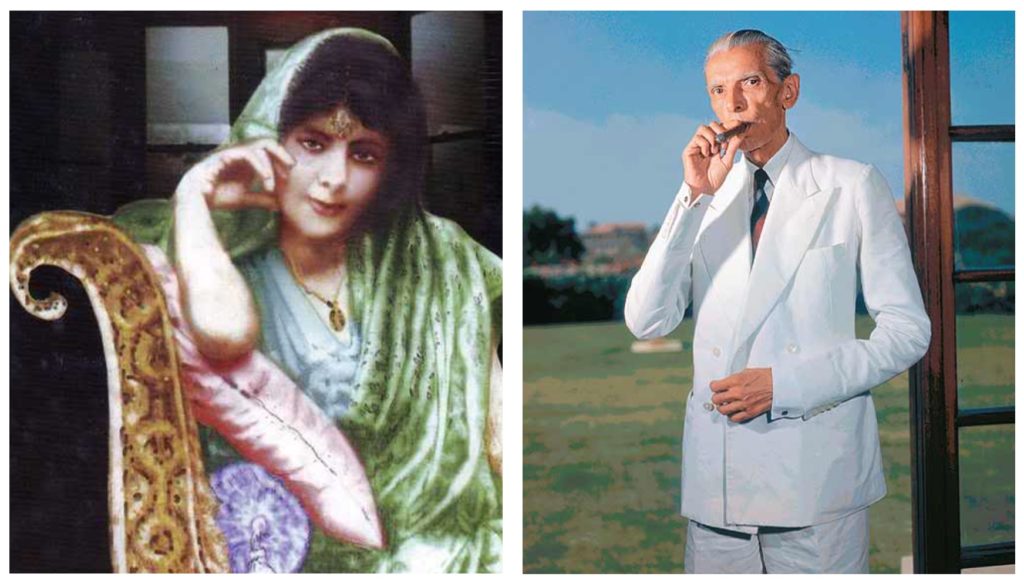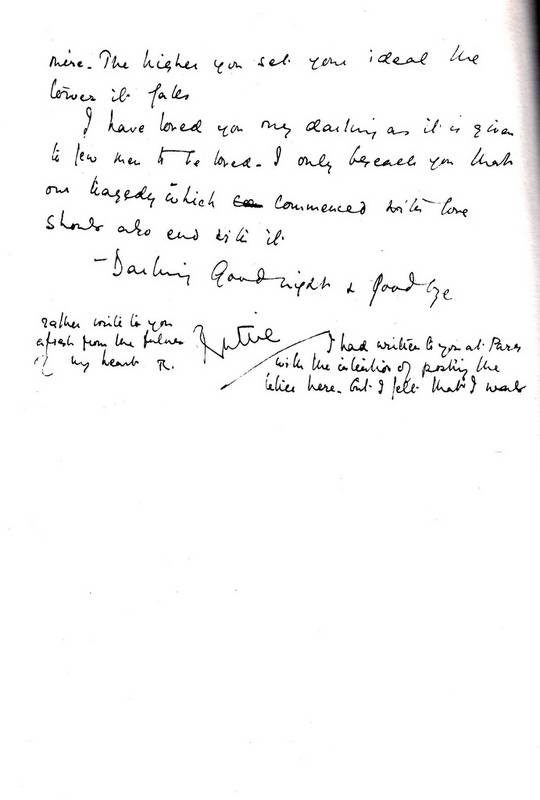Last week, while surfing though flickr, I came across a wonderful collection of mostly black & white photos by Dr. Ghulam Nabi Kazi. His collection has a major section Plain Mr. Jinnah dedicated to Quaid-i-Azam Muhammad Ali Jinnah’s rare photographs and some of his personal letters that not many people have ever read. Dr. Kazi is doing a great service by preserving all those historic photographs and letters for us and uploading them on flickr for public viewing. The one that I found most interesting, and which made me write this post, was the last letter written by Ruttenbai “Ruttie” Petit to her husband “J”, as she used to call him. Ruttie was given an Islamic name Mariam when she converted to Islam and married Jinnah in 1918. Ruttie originally wrote this letter in Paris on October 5, 1928 but re-wrote it in Marseilles and posted it from there. The letter is beautifully written and gives you some idea of marriage and personal life of Jinnah. For ATP reader’s interest, a typed text of the letter has also been included in this post.
S. S. Rajputana,
Marseilles 5 Oct 1928Darling thank you for all you have done. If ever in my bearing your once tuned senses found any irritability or unkindness, be assured that in my heart there was place only for a great tenderness and a greater pain -a pain my love without hurt. When one has been as near to the reality of Life (which after all is Death) as I have been dearest, one only remembers the beautiful and tender moments and all the rest becomes a half veiled mist of unrealities. Try and remember me beloved as the flower you plucked and not the flower you tread upon.
I have suffered much sweetheart because I have loved much. The measure of my agony has been in accord to the measure of my love.
Darling I love you, I love you – and had I loved you just a little less I might have remained with you only after one has created a very beautiful blossom one does not drag it through the mire. The higher you set your ideal the lower it falls.
I have loved you my darling as it is given to few men to be loved. I only beseech you that the tragedy which commenced in love should also end with it.
Darling Goodnight and Goodbye
Ruttie
I had written to you at Paris with the intention of posting the letter here but I felt that I would rather write to you afresh from the fullness of my heart. R.
Even today, not much is known about Jinnah’s personal life although a great deal has been written about his vision, politics and his role as a founder of nation. Like how many of you know that when he was a law student in London, he regularly did theatre and seriously considered acting as a profession. There are many reasons that not much is known about his life other than politics and Pakistan movement. He wrote little, and what he wrote was formal and a matter of fact. He wrote no autobiography or diary probably because he never had time to do so. He was reserved, taciturn and secretive. He wrote his will in May, 1939, but it was after his death that Liaqat Ali Khan, his close associate and first Prime Minister of Pakistan, came to know that he was its trustee and executor. ATP readers can take a look at Jinnah’s will here and I can tell you that many of you will find it very interesting. Although Prof. Akbar Ahmed’s movie Jinnah tried, to some extent, throw some light on Jinnah’s personal life but 15-20 minutes is no where near enough. His marriage with the most beautiful girl of Bombay – Ruttie: The Flower of Bombay – was like a fairy tale. A separate movie can be made on Jinnah’s pre 1940 life and I can assure you, if made properly, it will do serious business.
Dina Wadia (Jinnah’s daughter) has hardly spoken about her father in public. I know of a few books which are specifically about the personal life of Ruttie Jinnah and her relationship with her husband. These books give us some insight of Jinnah’s personal life. One of them is Ruttie Jinnah: The Story, Told and Untold by Khwaja Razi Haider. The book was originally published in Urdu but later Khwaja Sahab also translated it into English for the international audience. M C Chagla’s book, ‘Roses in December‘ also had a few chapters about Jinnah and Ruttie Jinnah. Chagla knew the couple very well as he assisted Jinnah at his chambers during those days and he later became Chief Justice of Bombay High Court and then an Indian diplomat at UN. He idealized Jinnah but severed all ties when he began working on the idea of independent state for Muslims. The book is also interesting because it help you understand a different viewpoint shared by many Muslims in India too. Chagla writes about Ruttie and Jinnah:
By 1927, Ruttie and Jinnah had virtually separated. Ruttie’s health deteriorated rapidly in the years after they returned from their final trip together. Ruttie lived at the Taj Hotel in Bombay, almost a recluse as she became more and more bed-ridden.Kanji continued to be her constant companion. By February 18, 1929 she had become so weak that all she could manage to say to him was a request to look after her cats.
Two days later, Ruttie Petit Jinnah died. It was her 29th birthday.
She was buried on February 22 in Bombay according to Muslim rites. Jinnah sat like a statue throughout the funeral but when asked to throw earth on the grave, he broke down and wept. That was the only time when I found Jinnah betraying some shadow of human weakness. It’s not a well publicised fact that as a young student in England it had been one of Jinnah’s dreams to play Romeo at The Globe. It is a strange twist of fate that a love story that started like a fairy tale ended as a haunting tragedy to rival any of Shakespeare’s dramas.”
But the one I found more detailed is the book Ruttie Jinnah: The story of a great friendship written by Ruttie’s closest friend Kanji Dwarkadas who was also looking after her when she fell seriously ill during her last days.Jinnah was a very private person and he hardly showed emotions but he is known to have cried twice in public. One of the occasion was the funeral of his beloved wife Ruttie in 1929 and the other one in August 1947, when he visited her grave one last time before leaving for Pakistan. Jinnah left India in August 1947, never to return again, but he left behind a piece of his heart in a little grave in a cemetery in Bombay.























































Ruttie was never given the name Marine, that’s a lie propagated by enemies of Pakistan
Greate pieces. Keep writing such kind of info on your blog.
Im really impressed by it.
Hi there, You’ve performed a fantastic job. I will
definitely digg it and individually recommend to my friends.
I am confiident they’ll be benefited from this web site.